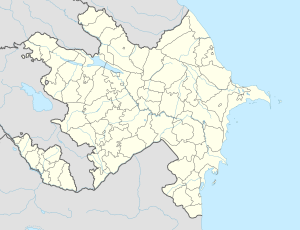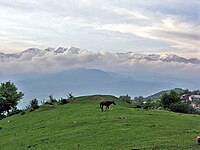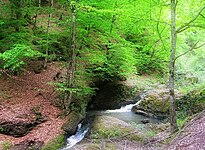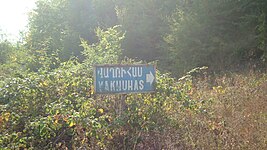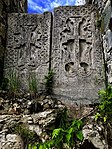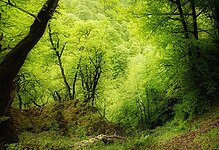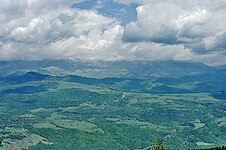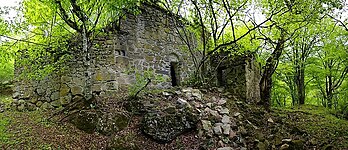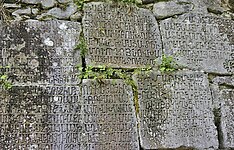Vaghuhas
Vaghuhas
Վաղուհաս | |
|---|---|
| Qozlu | |
 | |
| Coordinates: 40°06′52″N 46°28′47″E / 40.11444°N 46.47972°E | |
| Country | |
| • District | Kalbajar |
| Elevation | 988 m (3,241 ft) |
| Population (2015)[1] | |
• Total | 678 |
| Time zone | UTC+4 (AZT) |
Vaghuhas (Armenian: Վաղուհաս) or Gozlu (Azerbaijani: Qozlu) is a village located in the Kalbajar District of Azerbaijan, in the region of Nagorno-Karabakh. Until 2023 it was controlled by the breakaway Republic of Artsakh. The village had an ethnic Armenian-majority population[2] until the exodus of the Armenian population of Nagorno-Karabakh following the 2023 Azerbaijani offensive in Nagorno-Karabakh.[3]
History
[edit]
During the Soviet period, the village was a part of the Mardakert District of the Nagorno-Karabakh Autonomous Oblast.
According to civilian reports, during the 2023 Azerbaijani offensive in Nagorno-Karabakh, Azerbaijani soldiers entered the village and forcibly demanded that its entire Armenian population leave while firing their weapons in the air.[4][5]
Historical heritage sites
[edit]Historical heritage sites in and around the village include the ruins of the ancient Armenian settlement of Mayrakahag (Armenian: Մայրաքաղաք), including the Tiramayr Monastery (Armenian: Տիրամայր Վանք) built in 1183,[6] an 8th/9th-century chapel, a 12th/13th-century cemetery, the monastery of Khatravank (Armenian: Խաթրավանք) built in 1204, the monastery of Karmiravan (Armenian: Կարմիրավան) built in 1224, also known as the Red Monastery – Karmir Vank, Կարմիր վանք, and the medieval village of Hin Vaghuhas (Armenian: Հին Վաղուհաս, lit. 'Old Vaghuhas').[1]
Economy and culture
[edit]The population is mainly engaged in agriculture and animal husbandry. As of 2015, the village has a municipal building, a house of culture, a secondary school, seven shops, and a medical centre.[1]
Demographics
[edit]The village had 638 inhabitants in 2005,[7] and 678 inhabitants in 2015.[1]
Gallery
[edit]-
Scenery around Vaghuhas
-
Forest near the village
-
A sign in Armenian reading "Vaghuhas"
-
Khachkars of Khatravank
-
Forest near the village
-
Aerial view of Vaghuhas
-
Interior of Khatravank
-
The 13th-century Karmiravan Monastery
-
Inscriptions in Armenian on the walls of the Karmiravan Monastery
References
[edit]- ^ a b c d Hakob Ghahramanyan. "Directory of socio-economic characteristics of NKR administrative-territorial units (2015)".
- ^ Андрей Зубов. "Андрей Зубов. Карабах: Мир и Война". drugoivzgliad.com.
- ^ Sauer, Pjotr (2 October 2023). "'It's a ghost town': UN arrives in Nagorno-Karabakh to find ethnic Armenians have fled". The Guardian. ISSN 0261-3077. Retrieved 9 November 2023.
- ^ Hauer, Neil (September 29, 2023). "Tragedy in real time: The Armenian exodus from Nagorno-Karabakh". Canada: CTV News.
- ^ Grigoryan, Rima; Makiyan, Hayk (September 27, 2023). "Stranded in Goris: Karabakh Family Sleeps in Van". Armenia: Hetq.
- ^ Ш. Мкртчян / Майракахак или монастырь Тирамайр /Историко-архитектурные памятники Нагорно-Карабаха/ стр. 47-48 (360)
- ^ "The Results of the 2005 Census of the Nagorno-Karabakh Republic" (PDF). National Statistic Service of the Republic of Artsakh.

